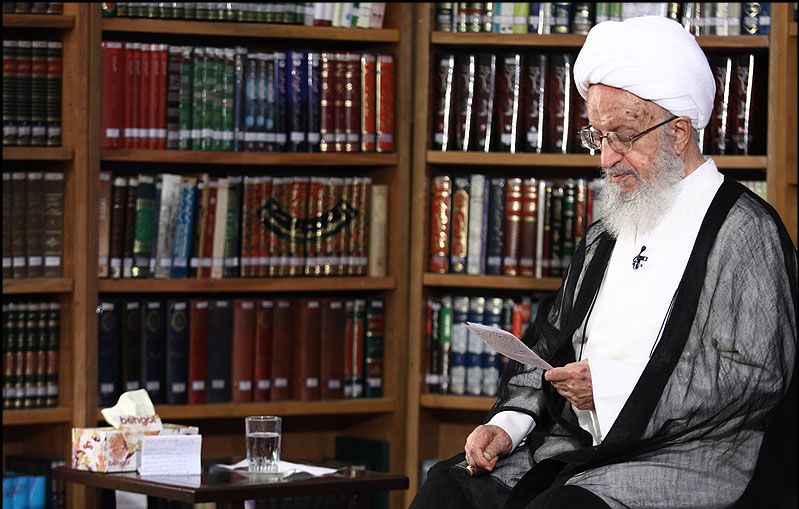On his nightly televised series of lectures, Ayatollah Makarem-Shirazi stated: "When Islamic societies attempt to remove poverty, they are performing the greater jihad and enjoining the good and forbidding the evil."
Speaking during a televised lectures about Du’a Makarim al-Akhlaq (Imam as-Sajjad’s “Supplication on Noble Moral Traits”) Grand Ayatollah Naser Makarem-Shirazi stated that the fourth infallible Imam, Ali ibn al-Husayn as-Sajjad (A) prayed: “Oh God, let me not be poor while with Thee is my plenty!”
His Eminence emphasized that Imam as-Sajjad (A) sought refuge in God from poverty. He added that the issue of poverty and wealth in one’s life, as well as in the Holy Quran and Islamic traditions reflects many important points in the divine commandments of Islam in this regard.
He explained that most people say that those who have a low income are poor and those who have a high income are wealthy, while such a person does not interpret it in this way. Islamic traditions explain that those whose soul is satisfied despite their low income are wealthy but those whose soul is thirsty for more, despite their high income, are actually poor.
The revered source of emulation added that Imam al-Husayn (A) considered a person who is greedy for money and property as a poor person and stated if that person had the world, that would still not be sufficient for him. “In our own eyes, we see on the media that those who have gained great wealth through illicit means, still seek more wealth. These people are truly poor,” he stressed.
Ayatollah Makarem-Shirazi explained those who are truly wealthy are those who are content with their income, no matter how little it is. “It should be noted that poverty and wealth should not be interpreted on the basis of public opinion, but upon the basis of Islamic narrations,” he stated.
He explained that Islam considers poverty as dangerous, due to the impact of poverty has on society. He noted a narration where Imam Ali (A) said to his son, Muhammad al-Hanafiyah (A), that he fears the day when he would be poor, as poverty can endanger or destroy one’s faith and causes one to be unable to think properly.
Ayatollah Makarem-Shirazi said that poverty is the source of many sins and can open the door to further sins, explaining that poverty can cause man to seek illegitimate methods to earning a living and inflicts one with oppression, usury, bribery and fraud. “It may be that a poor person has a strong faith and does not fall into such problems and sins but this is another issue,” he added.
“This is why Islam has confronted the issue of poverty,” he stated.
The professor in the Seminary of Qom added that one of the greatest afflictions for a nation is the dependence of poor people on the economic, political and cultural systems of a country, as it causes serious problems for the nation.
Ayatollah Makarem-Shirazi added that Muslims and Muslim societies must strive to eliminate poverty among themselves and create contentment and not allow some members of society to become dependent on others.
“When Islamic societies attempt to remove poverty, they are performing the greater jihad and enjoining the good and forbidding the evil,” he said.
/257
source : Rasa
Saturday
27 June 2015
3:05:28 PM
697645

On his nightly televised series of lectures, Ayatollah Makarem-Shirazi stated: "When Islamic societies attempt to remove poverty, they are performing the greater jihad and enjoining the good and forbidding the evil."
